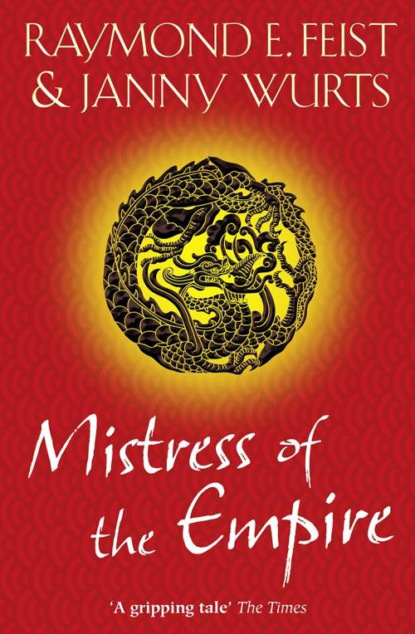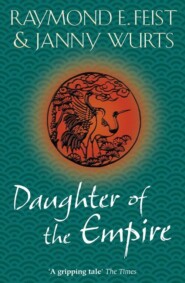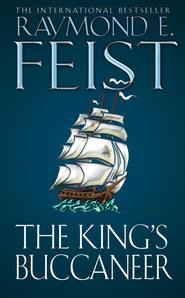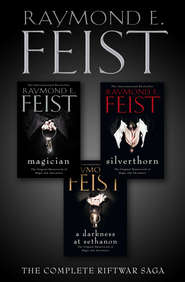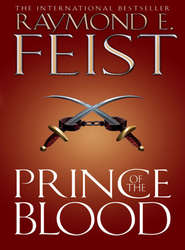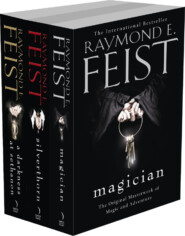По всем вопросам обращайтесь на: info@litportal.ru
(©) 2003-2025.
✖
Mistress of the Empire
Автор
Год написания книги
2018
Настройки чтения
Размер шрифта
Высота строк
Поля
Mara drank more of the delightful liquid, recalled to caution at last. ‘What of the Matawa?’
Janaio gave a deprecating cough. ‘Their offer was insulting, no, demeaning, and they lack the experienced factors you have in your employ. They require interpreters, still, to transact business, an uneasy situation for one in the luxury market, as I am. I desire no avenue that is ripe for misunderstanding, or even the outside chance of exploitation.’
Savoring the dregs of her drink, Mara said, ‘That much I can grant.’ Regret tinged her tone as she added, ‘I can’t limit others in bringing these beverages to us, but perhaps some shrewd buying in LaMut might hamper others from competing effectively against our interests.’ Then, content to entrust the disposition of final details to Jican, she prepared to take her leave.
The trader bowed, touching his forehead to the ground. ‘Mistress, your wisdom is legendary.’
Mara stood up. ‘When we are both made rich from the importation of chocolate to our Empire, then I will accept the compliment. But now other matters require my presence. Jican will draw up the documents sealing the partnership you request.’
While servants hurried in to collect the dirtied cups, and Jican’s brow furrowed as he confronted the intricate issues of trade, Mara left the room, helped by Lujan and Saric.
Outside, screened from view by the gloom of an inner corridor, Saric turned a sour eye on his mistress. ‘You took grave risks, my Lady. Any trader from Midkemia who was originally Tsurani-born could once have been sworn to the Minwanabi.’
Left short-tempered from missing her rest, Mara answered tartly. ‘You all saw. He drank equal portion.’ Then she softened. ‘And those rare drinks have made me feel wonderful.’
Saric bowed, his silence indicative of displeasure.
Mara moved on toward the nursery, where, even one wing distant, enraged yells could be heard from Justin. Her sigh turned into a laugh. ‘I am late, and the servants plainly have their hands fall.’ She laid a hand on her uncomfortably swollen middle. ‘I am anxious for this baby to get himself born, though with another, there will none of us get any peace.’ She headed in the direction of Justin’s ruckus with a girlish smile. ‘I may well come to miss being pampered when once again I must sit without the aid of two healthy young men.’
Lujan grinned in sly appreciation, his expression mirrored by Saric. ‘Hokanu will do his best, I am sure, to keep you with child indefinitely.’
Mara laughed, the bitter undertone not missed by her councilors. ‘He will, I am sure, if we can be made to agree that Justin should be the Acoma heir.’
‘Stubborn,’ Saric mouthed to his cousin over his Lady’s bent head.
Past nightfall, the trader called Janaio of LaMut returned with his retinue of hired Midkemian guards to a deserted warehouse in the city of Sulan-Qu. The hour was late. The wicks in the lamps in the rich quarter had burned down, while in the crumbling tenements near the riverside only the setting quarter moon cast any light. The streets lay under inky darkness, wreathed with mist off the Gagajin. Where once the disreputable population of the city had preyed as they pleased on what traffic dared to move abroad without guard, now the Emperor’s patrols drove Kentosani’s malcontents and vagrants into the deepest back alleys. The only skulkers in the open were the mongrel dogs, scavenging garbage from the markets.
Though calm by the standards of Tsuranuanni, to Midkemian ears the city was far from peaceful. Even from inside the warehouse, the shouts of a madam of the Reed Life could be heard insulting a client who had been rough with one of her girls. Dogs barked, and a wakeful jigabird crowed. Somewhere nearby, an infant wailed. The mercenaries hired to attend Janaio’s retinue shifted uneasily, the dank mud of the river flats an alien smell in their nostrils. They did not know why they had been brought to this empty, half-rotted building; nor did they understand precisely why they had been paid to cross the rift. Their employer had interviewed them carefully and required that they speak no Tsurani. But work in the Kingdom had slowed since the battle at Sethanon, and for men with few ties to home, the offered money had been good.
The bearers put down their bundles and waited for orders, while the bodyguards maintained their formation behind Janaio. Without sound, silk cords with weighted ends suddenly coiled down from the rafters. They caught and whipped tight, each encircling the throat of an unwary barbarian soldier.
Assassins in black followed, leaping from their unseen perches and using their weight and momentum to jerk the guards off their feet. Four men’s necks snapped instantly, while the others hung kicking and gagging as they were hoisted and slowly strangled.
The bearers watched in horror as the Midkemian mercenaries died. Wide-eyed, frozen in terror, they knew better than to dare raise an outcry. Their fear was short-lived. Two more black-clad assassins flitted out of the shadows and moved through their unarmed ranks like wind through standing rushes. In less than a minute, Janaio’s ten bearers lay dead, blood from their slashed throats pattering on the wood floor. The assassins who held the armed guards aloft released their cords. Dead Midkemians thumped in sprawled heaps, here one with his knuckles crumpled under his hip, and another there with his bitten-through tongue oozing blood through his beard.
Janaio removed his rich clothing and tossed it amid the corpses. One of the black-clad assassins bowed to him and offered a small bag. From this Janaio withdrew a dark robe and cast it over his shoulders. Quickly he took a vial from his pocket and lathered sweet-smelling ointment upon his hands. The grease dissolved a layer of concealing paint; were there more light, the red dye and tattoo of a Hamoi assassin would now be revealed.
From the thickest gloom of a corner a deep voice said, ‘Is it done?’
The man who was no trader, who called himself Janaio for convenience, bowed his head. ‘As you commanded, honored master.’
A heavyset man with a too-light tread stepped from concealment. His person clicked and clinked as he moved, as bone ornaments dangling from leather thongs jostled against the instruments of death he wore affixed to his belt. His robe was studded with bosses cut from the skulls of victims; his sandals had straps of cured human flesh. He cast no glance at the bodies littering the floor, though he disdained to step in the puddles. The Obajan of the Hamoi Tong nodded, the scalplock that hung from his otherwise shaved head twisting down his back. ‘Good.’ He raised a hugely muscled arm and plucked a vial from the breast of his robe. ‘You are certain she drank?’
‘As did I, master.’ The erstwhile trader bowed low yet again. ‘I placed the potion in the chocolate, knowing that drink to be the most irresistible. Her hadonra escaped, by luck of a burned tongue. But the Lady drank hers to the dregs. She swallowed enough slow poison to kill three men.’ This speech ended, the assassin licked his lips. Anxious, sweating, he controlled his nerves and waited.
The Obajan rolled the vial containing the antidote for the rare poison mixed with the chocolate between his thick palms. He watched with stony gaze as the eyes of his minion followed it; but the afflicted held in his desperation. He did not crack, and beg.
The Obajan’s lips parted in a smile. ‘You did well.’ He surrendered the vial, which was colored green, symbol of life. The man who had called himself Janaio of LaMut took the promise of reprieve in shaking hands, snapped off the wax seal, and drank the bitter draft down. Then he smiled also.
A second later, his expression froze. Fear touched him, and what at first appeared to be a spasm of uncertainty. His eyes widened as pain stabbed through his abdomen, and he glanced down at the emptied vial. Then his fingers lost their grip. The container with its false offer of life dropped and his knees wobbled. A groan escaped his lips. He fell to the floor, doubled over.
‘Why?’ His voice emerged as a croak, pinched between spasms of agony.
The Obajan’s reply was very soft. ‘Because she has seen your face, Kolos, as have her advisers. And because it suits the needs of the Hamoi. You die with honor, serving the tong. Turakamu will welcome you to his halls with a great feast, and you will return to the Wheel of Life in a higher station.’
The betrayed man fought his need to thrash in agony. Dispassionately the Obajan observed, ‘The pain will pass quickly. Even now life is departing.’
Beseeching, the dying man rolled his eyes up to seek the other’s face in the darkness. He fought a strangled, gasping breath. ‘But … Father …’
The Obajan knelt and laid a red-stained hand upon the forehead of his son. ‘You honor your family, Kolos. You honor me.’ The sweating flesh under his touch shuddered once, twice, and fell limp. Over the stink as the bowel muscles loosened in death, the Obajan stood up and sighed. ‘Besides, I have other sons.’
The master of the Hamoi Tong signaled, and his black-clad guard closed around him. Swiftly, silently, they slipped from the warehouse at his order, leaving the dead where they lay. Alone amid the carnage, unseen by living eyes, the Obajan took a small bit of parchment from his robe and cast it at the feet of his murdered son. The gold chain on the corpse would draw the notice of scavengers; the bodies would be found and pilfered, and the paper would surface in later investigation. As the tong chief turned on his heel to leave, the red-and-yellow chop of House Anasati fluttered down onto floorboards sticky with new blood.
The first pain touched Mara just before dawn. She awoke curled into a ball and stifled a small cry. Hokanu jerked out of sleep beside her. His hands found her instantly in concerned comfort. ‘Are you all right?’
The discomfort passed. Mara levered herself up on one arm and waited. Nothing happened. ‘A cramp. Nothing more. I am sorry to have disturbed you.’
Hokanu looked at his wife through the predawn greyness. He stroked back her tangled hair, the smile that had been absent for so many weeks lifting the corners of his mouth. ‘The baby?’
Mara laughed for joy and relief. ‘I think. Perhaps he kicked while I slept. He is vigorous.’
Hokanu let his hand slide across her forehead and down her cheek, then softly let it rest on her shoulder. He frowned. ‘You feel chilled.’
Mara shrugged. ‘A little.’
His worry deepened. ‘But the morning is warm.’ He brushed her temple again. ‘And your head is soaked in perspiration.’
‘It is nothing,’ Mara said quickly. ‘I will be all right.’ She closed her eyes, wondering uneasily whether the alien drinks she had sampled the evening before might have left her indisposed.
Hokanu sensed her hesitation. ‘Let me call the healer to see to you.’
The idea of a servant’s intrusion upon the first moment of intimacy she had shared with Hokanu in weeks rankled Mara. ‘I’ve had babies before, husband.’ She strove to soften her sharpness. ‘I am fine.’
Yet she had no appetite at breakfast. Aware of Hokanu’s eyes on her, she made light conversation and ignored the burning tingle that, for a moment, coursed like a flash fire down her leg. She had pinched a nerve from sitting, she insisted to herself. The slave who had served as her taster seemed healthy as he carried out the trays, and when Jican arrived with his slates, she buried herself in trade reports, grateful, finally, that the mishap over the cramp before dawn seemed to have banished Hokanu’s distance. He checked in on her twice, as he donned his armor for his morning spar with Lujan and again as he returned for his bath.
Three hours later, the pain began in earnest. The healers hurried to attend the Lady as she was carried, gasping, to her bed. Hokanu left a half-written letter to his father to rush to her side. He stayed, his hand twined with hers, and flawlessly kept his composure, that his fear not add to her distress. But herbal remedies and massage gave no relief. Mara’s body contorted in spasms, wringing wet from the cramps and pains. The healer with his hands on her abdomen nodded gravely to his helper.
‘It is time?’ Hokanu asked.
He received a wordless affirmative as the healer continued his ministrations, and the assistant whirled to send Mara’s runner flying to summon the midwife.
‘But so early?’ Hokanu demanded. ‘Are you sure nothing is amiss?’
The healer glanced up in harried exasperation. His bow was a perfunctory nod. ‘It happens, Lord Consort. Now, please, leave your Lady to her labor, and send in her maids. They will know better than you what she needs for her comfort. If you cannot stay still or find a diversion, you may ask the cooks to prepare hot water.’
Hokanu ignored the healer’s orders. He bent over, kissed his wife’s cheek, and murmured in her ear, ‘My brave Lady, the gods must surely know how I treasure you. They will keep you safe, and make your labor light, or heaven will answer to me for their failing. My mother always said that babes of Shinzawai blood were in a great rush to be born. This one of ours seems no different.’ Mara returned his kindness with a squeeze of her hand, before his fingers were torn from hers by servants who, at the healer’s barked directive, firmly pushed the consort of the Acoma out of his own quarters.
Hokanu watched his wife to the last instant as the screens were dragged closed. Then, abandoned to himself in the hallway, he considered calling for wine. He instantly changed his mind as he recalled Mara’s telling him once that her brutish first husband had drunk himself into a stupor upon the occasion of Ayaki’s birth. Nacoya had needed to slap the oaf sober to deliver the happy news of a son.





